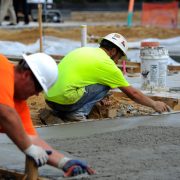Concrete industry urges regulators to keep pressure on building product compliance and conformance in wake of Senate Report on fire safety
The call by a Senate Committee for an immediate and total ban on the importation, sale and use of polyethylene core aluminium composite panels – similar to those used on London’s Grenfell Tower – has underlined the need for closer scrutiny of building product claims and compliance in Australia.
The Senate Economics References Committee last week released an interim report on aluminium composite cladding as part of its wider inquiry into non-conforming building products, and specifically in response to the recent Grenfell Tower fire disaster.
The Committee heard evidence that the non-compliant use of cladding is widespread, and that the development of policies to address both non-compliance (products used in applications where they don’t comply with building codes) and non-conformity (making false claims or not conforming to standards) is lagging.
Peak industry body Cement Concrete and Aggregates Australia (CCAA) has welcomed the Senate interim report.
“It puts a timely focus on building fire safety and the broader issue of non-conformance and non-compliance,” says CCAA CEO, Ken Slattery.
“Building owners and occupiers should rightly be concerned. But equally, it’s important to recognise that there are products out there that deliver excellent fire safety performance in medium and high-rise development – concrete being one of them.”
Mr Slattery said concrete had a number of inherent features that worked to mitigate fire risk.
“Apart from the obvious – that it simply doesn’t burn – concrete doesn’t release toxic fumes, and because of its relatively slow rate of heat transfer acts as a heat shield to protect building occupants.
“As well as being non-combustible, It’s also inherently versatile and economical. A concrete element can be used for simultaneous load bearing, cladding and separation of spaces, and fire safety.”
CCAA is currently developing a conformity assurance scheme (CemAssure) for the Australasian cementitious materials industries that has recently been recognised by the Joint Accreditation System of Australia and New Zealand (JAS-ANZ), an internationally recognised accreditation service instigated by the Australian and NZ governments.
“CemAssure, once operating in the market, will provide third-party conformity assessment of cement, fly ash, slag and amorphous silica products –all essential to the manufacture of concrete and commonly used across the Australia construction industry.
“CemAssure is designed to provide assurance to building designers and specifiers, as well as consumers, that these cementitious products, being essential for concrete manufacture, have been independently verified as being fit-for-purpose and conforming to specified requirements.”
Mr Slattery says with new building products such as timber composites coming onto the market, coupled with the risk posed by non-conforming imported materials, it is more important than ever that Australia prioritises fire safety performance and has a rigorous conformance and compliance regime.
“The Senate Report is a wake-up call,” he says.
“It’s important for all Australian governments to support that call, but more broadly to act quickly and decisively to tighten our conformance and compliance regime.”

